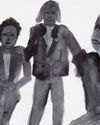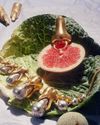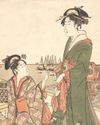As it turns out, anyone can achieve a different nose without plastic surgery. The caveat: it won’t last forever.

THE VIDEO, AS SEEN on Facebook and shared by a makeup artist acquaintance, starts innocently enough: a beautiful Chinese girl, with large anime-like eyes, a pointed pixie face and an exquisite nose, slim and narrow at the bridge and pointy and upturned at the tip. I pause my scrolling, intrigued at how it will play out.
The girl smiles angelically and flutters her long lashes, and proceeds to stab through the bridge of her nose with a metal skewer. She peels her nose off with the skewer and begins to scrape at it, except it’s not really her nose that she had so brutally excised from her face, but a prosthetic one, created out of wax putty — the kind of material used to make theatrical facial prosthetics and realistic-looking scars and wounds.
The rest of the girl’s “reverse transformation” is de rigeur of typical makeup removal videos: false eyelashes and circle lenses taken out, heavy foundation and contouring wiped off, wigs and hair extensions casually pulled off. In the end, the bare face of the doll-like girl is revealed to be just as average as any other young woman one might see on the streets in Asia; one with almond-shaped eyes and a petite button nose, typical of many East Asians.
The video continues in a similar vein, chronicling pretty Chinese girls scraping off their putty noses and wiping off artificially constructed features. Amazed, I immediately share my incredulity to my friends list.
Most are similarly impressed. Many more demand to know what the putty noses are made of, and if it’s a new beauty trend. Another makeup artist friend posits that it’s most likely a prank, and that the noses are made from a blend of Vaseline, baby powder and foundation. It’s a basic, do-it-yourself prosthetic, he claims, adding that the effect will only last less than two hours in real life, and that it had looked realistic in the video because of the heavy filters used.
Diese Geschichte stammt aus der August 2018-Ausgabe von T Singapore: The New York Times Style Magazine.
Starten Sie Ihre 7-tägige kostenlose Testversion von Magzter GOLD, um auf Tausende kuratierte Premium-Storys sowie über 8.000 Zeitschriften und Zeitungen zuzugreifen.
Bereits Abonnent ? Anmelden
Diese Geschichte stammt aus der August 2018-Ausgabe von T Singapore: The New York Times Style Magazine.
Starten Sie Ihre 7-tägige kostenlose Testversion von Magzter GOLD, um auf Tausende kuratierte Premium-Storys sowie über 8.000 Zeitschriften und Zeitungen zuzugreifen.
Bereits Abonnent? Anmelden

Look At Us
As public memorials face a public reckoning, there’s still too little thought paid to how women are represented — as bodies and as selves.

Two New Jewellery Collections Find Their Inspiration In The Human Anatomy
Two new jewellery collections find their inspiration in the human anatomy.

She For She
We speak to three women in Singapore who are trying to improve the lives of women — and all other gender identities — through their work.
Over The Rainbow
How the bright colours and lively prints created by illustrator Donald Robertson brought the latest Weekend Max Mara Flutterflies capsule collection to life.

What Is Love?
The artist Hank Willis Thomas discusses his partnership with the Japanese fashion label Sacai and the idea of fashion in the context of the art world.

The Luxury Hotel For New Mums
Singapore’s first luxury confinement facility, Kai Suites, aims to provide much more than plush beds and 24-hour infant care: It wants to help mothers with their mental and emotional wellbeing as well.

Who Gets To Eat?
As recent food movements have focused on buying local or organic, a deeper and different conversation is happening among America’s food activists: one that demands not just better meals for everyone but a dismantling of the structures that have failed to nourish us all along.

Reimagining The Future Of Fashion
What do women want from their clothes and accessories, and does luxury still have a place in this post-pandemic era? The iconic designer Alber Elbaz thinks he has the answers with his new label, AZ Factory.

A Holiday At Home
Once seen as the less exciting alternative to an exotic destination holiday, the staycation takes on new importance.
All Dressed Up, Nowhere To Go
Chinese supermodel He Sui talks about the unseen pressures of being an international star, being a trailblazer for East Asian models in the fashion world, and why, at the end of the day, she is content with being known as just a regular girl from Wenzhou.